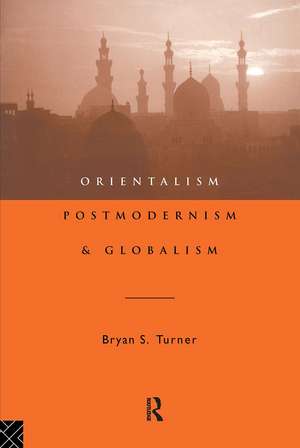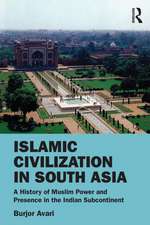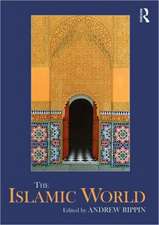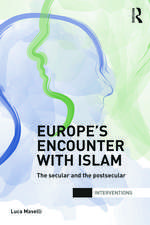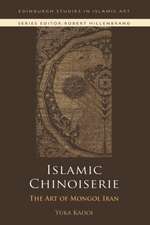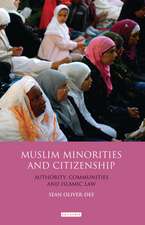Orientalism, Postmodernism and Globalism
Autor Professor Bryan S Turneren Limba Engleză Paperback – 13 oct 1994
| Toate formatele și edițiile | Preț | Express |
|---|---|---|
| Paperback (1) | 446.37 lei 6-8 săpt. | |
| Taylor & Francis – 13 oct 1994 | 446.37 lei 6-8 săpt. | |
| Hardback (1) | 1000.27 lei 6-8 săpt. | |
| Taylor & Francis – 22 iun 2016 | 1000.27 lei 6-8 săpt. |
Preț: 446.37 lei
Nou
Puncte Express: 670
Preț estimativ în valută:
85.41€ • 89.50$ • 70.61£
85.41€ • 89.50$ • 70.61£
Carte tipărită la comandă
Livrare economică 12-26 aprilie
Preluare comenzi: 021 569.72.76
Specificații
ISBN-13: 9780415108621
ISBN-10: 0415108624
Pagini: 244
Dimensiuni: 156 x 234 x 19 mm
Greutate: 0.38 kg
Ediția:1
Editura: Taylor & Francis
Colecția Routledge
Locul publicării:Oxford, United Kingdom
ISBN-10: 0415108624
Pagini: 244
Dimensiuni: 156 x 234 x 19 mm
Greutate: 0.38 kg
Ediția:1
Editura: Taylor & Francis
Colecția Routledge
Locul publicării:Oxford, United Kingdom
Recenzii
'... this stimulating and provoking collection of essays which, using various conceptual templates, explores the relationship between critiques of orientalism, postmodernism, and the changing role of intellectuals in an increasingly globalized world. Turner is a fine organizer and sifter of the history of sociological thought' - Ecumene
'His book is interesting and well-written. It makes some provocative points.' - Network, Spring 1995
'For ever challenging and demanding, but also for ever stimulating and gratifying, Bryan Turner's critical reflections on Orientalism, Postmodernism and Globalism deserves the reader's fullest attention.' - Journal of Islamic Studies
'His book is interesting and well-written. It makes some provocative points.' - Network, Spring 1995
'For ever challenging and demanding, but also for ever stimulating and gratifying, Bryan Turner's critical reflections on Orientalism, Postmodernism and Globalism deserves the reader's fullest attention.' - Journal of Islamic Studies
Cuprins
Part 1 Orientalism; Chapter 1 Orientalism, postmodernism and religion; Chapter 2 Orientalism and the problem of civil society in Islam While; Chapter 3 Accounting for the Orient; Part 2 II Orientalists; Chapter 4 Conscience in the construction of religion; Chapter 5 Gustave von Grunebaum and the mimesis of Islam; Part 3 III Globalism; Chapter 6 Politics and culture in Islamic globalism; Chapter 7 From orientalism to global sociology; Chapter 8 The concept of ‘the world’ in sociology; Part 4 IV Intellectuals and postmodernism; Chapter 9 Nostalgia, postmodernism and the critique of mass culture; Chapter 10 The two faces of sociology: global or national?; Chapter 11 Ideology and utopia in the formation of an intelligentsia; Part 5 V Modernity; Chapter 12 From regulation to risk; Chapter 13 The self and reflexive modernity; Chapter 14 Conclusion ReferencesIndex;
Notă biografică
Bryan S.Turner is Dean of the Faculty of Arts and Professor of Sociology at Deakin University, Australia.
Descriere
This book represents a remarkable synthesis of recent discussion and debate regarding crucial aspects of postmodernization, religious change and the globalization of world society.
